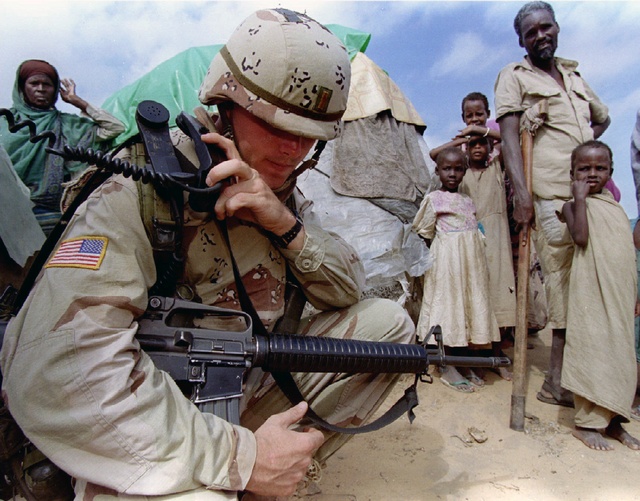
A U.S. soldier radios base, watched by displaced villagers, Mogadishu
Image courtesy of: REUTERS/Dan Eldon (SOMALIA)
I have been reading the book Confessions of an Economic Hitman. In the third-to-last chapter of the book, the following quote from the New York Times of 14 April 2002 is included:
“[The United States] supported authoritarian regimes throughout Central and South America during and after the cold war in defense of its economic and political interests.
In tiny Guatemala, the Central Intelligence Agency mounted a coup overthrowing the democratically elected government in 1954, and it backed subsequent right-wing governments against small leftist rebel groups for four decades. Roughly 200,000 civilians died.
In Chile, a C.I.A.-supported coup helped put Gen. Augusto Pinochet in power from 1973 to 1990. In Peru, a fragile democratic government is still unraveling the agency’s role in a decade of support for the now-deposed and disgraced president, Alberto K. Fujimori, and his disreputable spy chief, Vladimiro L. Montesinos.”
Folks, allow me to repeat that that is a quote from the New York Times .
It is human nature to read this kind of narrative and begin to draw parallels between it and one’s own experience. (Human nature errs also; we sometimes inflate our own importance.) It is therefore difficult to read this article and find innocence in Raila’s sojourns in the US this year, or innocence in the speeches he made during his visit and upon his return. While in the U.S. he criticized Jubilee for blanket condemnation of an entire community (i.e. for targeting Somalis’ in its investigations on terrorism) – fairly inflammatory talk at a time when grenades were going off in matatus and markets. In the Uhuru Park speech he gave upon his return, he (at that time) gave Jubilee 60 days to convene national dialogue, prompting fears that CORD was seeking regime-change.
Let us add to this knowledge the fact that we have struck oil. Or rather that – perhaps more ominously – Western companies have struck oil in northern Kenya. Oil has been a major factor in many bitterly tragic tales of US neo-colonialism: in Iran in 1953; in Iraq in 1991 and in 2003; in Venezuela in a failed coup attempt in 2002; and in all likelihood Libya in 2011 to name but a few examples. The fact that Kenya has reserves of oil gives cause for a deepening of already grave concerns.
It is alleged that as Minister for Energy, Raila orchestrated the entry into the Kenyan market of Bakri Energy, a wealthy Arabian conglomerate; his brother Dr. Oburu Odinga is an active Director in the company (I was told this by a man who was a staff member of Bakri at the time). If this is true, then Raila Odinga is no stranger to the Machiavellian interplay between politics and wealth that always impoverishes a nation’s citizens.
Having carefully weighed all these issues, it becomes us to be extremely wary of the kind of foreign influence that does not directly benefit the Kenyan people (China is no saint, and this is why looking East is a fallacy that Jubilee itself has abandoned). We need the West’s markets for our tea, our horticultural products, our coffee, our tourism, and in future (we hope) our oil. We also need the East’s infrastructure and its technology. But these trades must be done on terms that are fair to Kenya and to all her people, and not merely a select political few.
Happy New Year, and may God bless the nation of Kenya.
Paul
December 31, 2014 at 11:54 pm
My brother Sam, thanks for this observation. We read about “my people perishing from ignorance” and you have travelled quite far towards resolving that.. God bless you in 2015 and beyond.